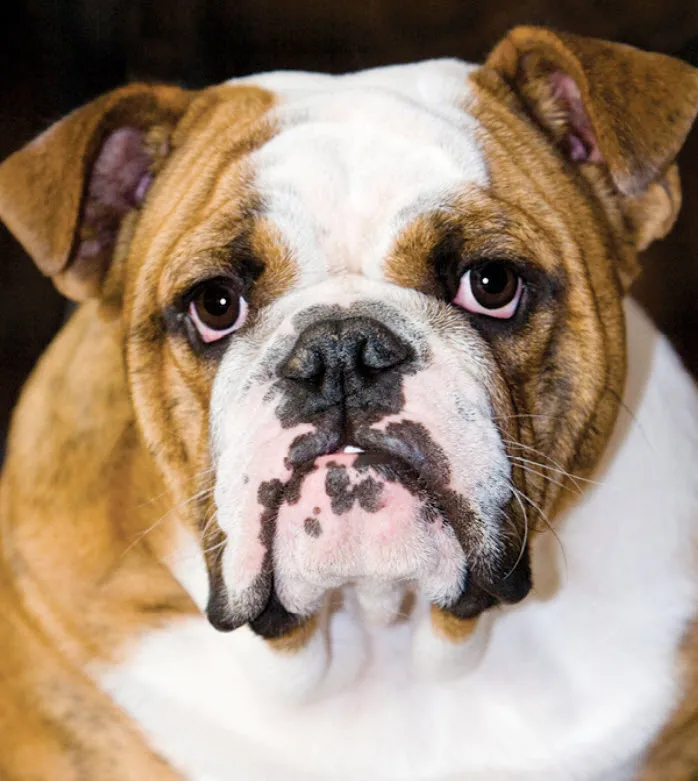English Bulldogs, with their distinctive wrinkled faces and endearing personalities, are truly unique companions. Known for being affectionate, remarkably easygoing, and exceptionally lovable, these sturdy dogs integrate wonderfully into family life. They are generally quiet, not prone to excessive barking, and display excellent temperament with children and other pets, making them outstanding companion care vets for many households. Beyond their gentle nature, Bulldogs are courageous and dependable, often acting as excellent guard dogs, and they adapt well to various living environments. Their outgoing and friendly demeanor makes them a joy to be around, offering steadfast loyalty and plenty of heartwarming moments.
However, owning an English Bulldog also means understanding their specific needs and common breed characteristics. You might notice your “bully buddy” can be prone to gassiness and excessive drooling. They are also famous for their unique symphony of snorting, snuffling, wheezing, and snoring sounds due to their brachycephalic (short-nosed) features. This breed can become overweight easily if not exercised regularly, and while charming, they can be rambunctious and rowdy, especially as puppies. English Bulldogs are sensitive and mature slowly, sometimes displaying possessiveness over toys and food, tending to show dominance if not properly socialized and trained early. An intelligent and dependable companion, the English Bulldog forms close human bonds, and with consistent leadership and early socialization, she is a cheerful addition to any family. This comprehensive English Bulldog Care guide will help you understand how to best support your beloved pet throughout her life.
Understanding Your English Bulldog’s Health
As a dedicated owner, ensuring your English Bulldog’s well-being is paramount. We’ve compiled a summary of important health considerations specific to the breed, allowing us to tailor a preventive health plan to monitor and mitigate predictable risks. Many health conditions in dogs are genetic, meaning they are linked to the breed. While your English Bulldog may not develop these issues, she is at a higher risk than other breeds. This section outlines common health concerns, providing an overview of what to watch for in your Bulldog’s future. It’s important to remember this guide cannot cover every possibility; always consult your veterinarian if you observe any unusual signs or symptoms. This information is designed to help both you and your veterinary team plan for your pet’s unique medical needs. We’ve also included practical tips for at-home care to keep your English Bulldog feeling her best.
Dental Disease
Dental disease is a pervasive chronic problem affecting approximately 80% of all dogs by the age of two, and unfortunately, English Bulldogs are particularly susceptible. It typically begins with tartar accumulation on the teeth, progressing to gum and tooth root infections. Without intervention, dental disease can lead to tooth loss and endanger vital organs such as the kidneys, liver, heart, and joints. In severe cases, it can even shorten your Bulldog’s lifespan by one to three years. Regular professional dental cleanings and consistent at-home care, including brushing her teeth at least three times a week, are crucial for maintaining her oral health.
Infections
English Bulldogs are susceptible to the same bacterial and viral infections that can affect all dogs, including common ailments like parvovirus, rabies, and distemper. Many of these infections are preventable through a tailored vaccination schedule, which your veterinarian will recommend based on regional disease prevalence, your dog’s age, and other individual factors. Keeping up-to-date with vaccinations is a cornerstone of effective English Bulldog care.
Obesity
Obesity poses a significant health risk for English Bulldogs. It is a serious condition that can cause or exacerbate joint problems, metabolic and digestive disorders, back pain, and heart disease. While it’s natural to want to indulge your Bulldog when she gazes at you with her soulful eyes, overfeeding her with human food and excessive treats can “love her to death.” Instead, consider alternative forms of affection, such as a hug, a gentle brush of her fur or teeth, an engaging game, or a refreshing walk. These gestures of care will benefit both her health and your bond. Feeding a high-quality diet appropriate for her age and avoiding people food are essential for managing her weight. For puppies, selecting the best dog food for english bulldog puppy is vital for healthy growth without excessive weight gain.
Parasites
A wide array of internal and external parasites can infest your English Bulldog. From fleas, ticks, and ear mites affecting her skin and ears, to hookworms, roundworms, heartworms, and whipworms that can invade her internal systems. These internal parasites can be contracted through various means, including drinking contaminated water, walking on infected soil, or being bitten by an infected mosquito. Some of these parasites pose a risk of transmission to humans, making their prevention and control a serious concern for everyone in the household. For your English Bulldog, parasites can cause significant pain, discomfort, and in severe cases, even be fatal. Regular testing by your veterinarian is crucial for early detection, and preventive medication will be recommended as needed to keep your beloved pet healthy and free from these invaders.
Spay or Neuter
One of the most beneficial decisions you can make for your English Bulldog’s long-term health is to have her spayed (for females) or neutered (for males). Spaying involves the surgical removal of the ovaries and typically the uterus, while neutering entails the surgical removal of the testicles. These procedures significantly decrease the likelihood of certain types of cancers and completely eliminate the possibility of unintended pregnancies or fathering unwanted puppies. This surgery also provides an opportune moment, while your pet is under anesthesia, to identify and address other potential health issues specific to the breed, such as conducting hip X-rays or extracting a puppy tooth if necessary. This approach is both convenient for you and less stressful for your dog. Routine blood testing prior to surgery is also performed to identify and take precautions against common problems that could increase anesthetic or surgical risks. Your veterinary team will discuss any specific concerns they will be monitoring.
Genetic Health Predispositions in English Bulldogs
English Bulldogs are a breed with specific genetic predispositions that owners should be aware of to provide optimal English Bulldog care. While not every Bulldog will experience these conditions, understanding the risks allows for proactive monitoring and early intervention, which can significantly improve their quality of life.
Bone and Joint Problems
English Bulldogs are prone to several musculoskeletal problems. While the list may seem extensive, each condition can be accurately diagnosed and effectively treated to prevent unnecessary pain and suffering. Through diligent observation at home and a good understanding of these potential diseases, you can provide excellent care for your Bulldog’s bone, joint, and muscle health throughout his life.
Both the hips and elbows are at risk for dysplasia, an inherited disease that causes improper joint development and leads to arthritis. Stiffness in your Bulldog’s elbows or hips may become noticeable, particularly as he matures. You might observe lameness in his legs or difficulty rising from a lying position. Early treatment for arthritis is crucial to minimize discomfort and pain. Your veterinarian will use X-rays to identify these issues as early as possible. In severe, life-limiting cases, surgery may be a viable option. It’s important to remember that overweight dogs can develop arthritis years earlier than those of normal weight, leading to preventable pain and suffering.
Another condition, osteochondritis dissecans (OCD), can occur in Bulldog puppies if they grow too quickly, causing cartilage in their joints to improperly attach to the bone. If OCD develops, surgery may be necessary to correct it. It’s best to adhere to recommended growth rates, typically no more than four pounds per week, by avoiding overfeeding and refraining from additional calcium supplements. Feeding a large-breed puppy diet rather than an adult or regular puppy formula is advisable, and weighing your puppy every three to four weeks helps monitor his growth.
The cranial cruciate ligament is one of the four strong tissue bands stabilizing each knee. A torn cranial cruciate ligament is a common injury in active dogs, including English Bulldogs. Surgical correction is usually performed to stabilize the knee and prevent debilitating arthritis. Physical therapy and comprehensive pain management are essential for the best outcome. Maintaining an ideal weight, feeding a high-quality diet, and avoiding activities that involve excessive knee twisting (like playing Frisbee) are key to preventing this painful injury.
Spinal Deformities
English Bulldogs are more susceptible than other dog breeds to being born with spinal deformities, such as hemivertebrae. This condition can lead to spinal cord damage, instability, or disability. Early X-rays during puppyhood are crucial for early identification, as symptoms can worsen with age, weight, and even activity levels. Should your Bulldog develop symptoms of back problems later in life, your veterinarian will rule out other causes like slipped spinal discs or arthritis and may prescribe medication, acupuncture, or rehabilitation to manage the condition.
Eye Problems
The proper functioning of your dog’s eyes significantly impacts their quality of life. Unfortunately, English Bulldogs can inherit or develop several different eye conditions. Some of these can lead to blindness if not promptly treated, and many are extremely painful. Your veterinarian will meticulously evaluate your Bulldog’s eyes during every examination to look for any signs of concern, ensuring comprehensive English Bulldog care.
Distichiasis is a condition caused by extra hairs growing inside the eyelid, which then rub against the eye’s surface. This is one of the most commonly inherited diseases in dogs, and English Bulldogs are particularly prone to developing this painful condition. Left untreated, these abnormal hairs can cause corneal ulcers and chronic eye pain. Fortunately, several effective treatment options are available, and the prognosis is good once the hairs have been permanently removed.
Entropion is a condition where the eyelid rolls inward, causing the eyelashes to rub against the cornea (the surface of the eyeball). This is an incredibly irritating and painful disorder that can ultimately result in blindness. While it can affect any dog breed, your English Bulldog is especially at risk for this hereditary condition. Surgical correction is typically successful if performed early.
Dry eye, also known as keratoconjunctivitis sicca (KCS), is common in English Bulldogs. In this condition, the tear glands do not produce enough tears to keep the eye adequately moist, leading to sore, itchy eyes and frequent infections. Symptoms include a thick discharge, squinting, pawing at the eye, or a dull, dry appearance. This is a painful condition, so contact your veterinarian immediately if you notice any of these signs. A tear test will be conducted during examination, and if diagnosed, your dog will require lifelong ointment application.
Dogs possess a third eyelid that contains a gland responsible for producing about one-third of the fluid that lubricates the eye. If this gland becomes sore or swollen, it protrudes as a red blob in the corner of the eye, a condition known as cherry eye. This can appear very suddenly in one or both eyes and is more common in puppies or young English Bulldogs. Initial treatment may involve ointment, but surgery is often the most effective solution.
 A young, playful English Bulldog lying on its side, looking up with curious eyes.
A young, playful English Bulldog lying on its side, looking up with curious eyes.
Bladder or Kidney Stones
English Bulldogs are more predisposed to developing various types of kidney or bladder stones compared to other breeds. These stones can cause significant pain. Your veterinarian will periodically test your Bulldog’s urine for telltale signs of their presence. If your pet shows symptoms like blood in the urine, inability to urinate, or straining to urinate, it constitutes a medical emergency. Contact your vet immediately if you observe any of these critical signs, especially since it could be related to severe conditions like stage 3 kidney disease in dogs symptoms.
Respiratory Distress Syndrome
This condition, also known as brachycephalic syndrome, specifically affects short-nosed dogs like your English Bulldog. These dogs possess the same amount of tissue in their nose and throat as longer-nosed breeds, but without adequate space for it. Consequently, their soft palate (the soft part at the back of the roof of the mouth) is often too long, obstructing the airway. Their nostrils are frequently too small, and sometimes the trachea, or windpipe, is narrow and undersized. All these factors contribute to a constricted and obstructed airway, making it difficult for many of these dogs to breathe properly. Watch for signs such as exercise intolerance, loud breathing, coughing, bluish gums, or fainting. Due to their short noses, English Bulldogs are also more prone to other issues like flatulence from excessive air intake, pneumonia from aspirating food, or heat stroke. In severe cases, surgical correction may be recommended to improve their breathing.
 A close-up of an English Bulldog's face, showing its characteristic wrinkles and a calm expression.
A close-up of an English Bulldog's face, showing its characteristic wrinkles and a calm expression.
Bleeding Disorders
Several types of inherited bleeding disorders can occur in dogs, ranging in severity from very mild to life-threatening. Often, a pet appears normal until a serious injury or surgery triggers severe bleeding. Von Willebrand’s disease, a blood clotting disorder, is frequently observed in English Bulldogs. Before any surgical procedure, your veterinarian will conduct diagnostic testing for blood clotting time or a specific DNA blood test to screen for Von Willebrand’s disease or similar disorders.
Reproductive Difficulties
Breeds characterized by a large head and a small pelvis, like the English Bulldog, are more prone to complications during the birthing process. Their pelvis is often too small to allow puppies to pass naturally, making a C-section frequently necessary for the health of both the mother and her offspring. If you are considering breeding your English Bulldog, it is crucial to discuss this with your veterinarian first. They can help you make an informed decision based on the body conformation of both the sire and dam.
Heart Disease
English Bulldogs are susceptible to multiple types of heart disease, which can manifest at various stages of life. During examinations, your veterinarian will carefully listen for heart murmurs and abnormal heart rhythms. When indicated by your dog’s risk factors, an annual heart health check may be performed, potentially including X-rays, an ECG, or an echocardiogram. Early detection of heart disease often allows for medication to be initiated, which can significantly prolong your pet’s life for many years. Additionally, maintaining excellent veterinary dental care and effective weight control are vital preventative measures against heart disease.
 A serene English Bulldog lying comfortably, looking towards the viewer.
A serene English Bulldog lying comfortably, looking towards the viewer.
Multiple Skin Problems
Your English Bulldog is prone to various skin infections and diseases. One common issue is Malassezia dermatitis, caused by yeast. When it affects the ears, symptoms include itching, redness, and an accumulation of brown, waxy discharge. On the skin, it manifests as greasy, hairless areas, particularly around the neck and throat, often accompanied by a distinct odor. Another frequent skin condition, seborrhea, can lead to either dry, flaky skin or greasy, oily skin. Both diseases cause your pet significant itchiness and discomfort. Bathing with specialized shampoos and rinses can be beneficial, and your veterinarian will treat any underlying issues such as allergies. Prompt veterinary attention for skin problems is essential to prevent them from escalating, ensuring you don’t end up with an itchy, bald, and smelly dog. For rapid solutions, understanding how do you heal hot spots on dogs fast can also be beneficial in managing acute issues.
Mange
Demodex is a microscopic mite that naturally resides in the hair follicles of all dogs. Typically, a dog’s immune system keeps these mites in check. However, certain breeds, including your English Bulldog, can develop an overabundance of these mites, leading to a condition called demodicosis or mange. In mild cases, owners might notice a few dry, irritated, hairless lesions, often appearing on the face or paws, which may or may not be itchy. Secondary bacterial skin infections can also occur. Prompt veterinary care is crucial to prevent the disease from becoming severe. Many pets seem to outgrow the problem, while others require lifelong management.
Laryngeal Paralysis
Older English Bulldogs may develop laryngeal paralysis, a condition where the vocal cords become paralyzed and hang into the airway. Watch for noisy breathing, especially during exercise or in hot, humid weather. In severe cases, a pet can collapse and experience significant difficulty breathing. Mild cases can often be managed with environmental adjustments at home and potentially medication. If you notice these signs, bring your dog in for an examination right away, as it’s important to address this issue before it becomes a surgical emergency.
Cancer
Cancer is a leading cause of death in older dogs. Given that English Bulldogs often enjoy a longer lifespan than many other breeds, they are more susceptible to developing cancer in their golden years. Many cancers can be successfully cured by surgical removal, and some types are treatable with chemotherapy. Early detection is critically important! Your veterinarian will perform periodic diagnostic tests and carefully check for any lumps and bumps during your pet’s examinations.
Dental Abnormalities
Dental abnormalities are often genetically inherited and are relatively common in dogs, particularly in purebreds like your English Bulldog. An overbite or underbite is medically referred to as a malocclusion, or a bad bite. Oligodontia is a condition characterized by the presence of only a few teeth. Misaligned teeth can also occur, leading to numerous problems, but these can usually be corrected with braces or extractions (yes, dogs can get braces!). Maintaining your Bulldog’s dental health is crucial, so your veterinarian will closely monitor her developing teeth. Keeping their oral health in check is also important for overall digestive well-being, as some dog breeds prone to sensitive stomachs may have their issues compounded by poor dental health.
Essential Home Care for Your English Bulldog
Much of what you can do to keep your English Bulldog happy and healthy involves common sense practices, similar to human care. This includes carefully monitoring her diet, ensuring she receives adequate exercise, regularly brushing her teeth and coat, and promptly contacting your veterinarian or an emergency pet hospital if anything seems unusual. It is crucial to adhere to the schedule of examinations and vaccinations recommended by your vet. These appointments are essential for necessary “check-ups” and for testing for diseases and conditions commonly found in English Bulldogs. Another very important step in providing comprehensive English Bulldog care is enrolling in pet health insurance, which can help cover the costs of medical tests and procedures your pet will undoubtedly need throughout her life.
Routine Care, Diet, and Exercise
Building a consistent routine for your English Bulldog’s care into your daily schedule is vital for her to live a longer, healthier, and happier life. The importance of a proper diet and exercise routine cannot be overstated for this breed.
- Supervise your pet as you would a toddler. Keep doors closed, pick up after yourself, and block off rooms as necessary to keep her out of trouble and away from objects she shouldn’t ingest.
- Grooming needs are relatively low. Brush her coat as needed, at least weekly, to keep it healthy.
- Dental health is critical. English Bulldogs often face serious dental problems, so you’ll need to brush her teeth at least three times a week!
- Clean her ears weekly, even as a puppy. Your veterinarian can show you the correct technique.
- Her deep wrinkles require frequent cleaning and drying to prevent infections and skin irritation.
- Exercise is essential. As an adult, your English Bulldog can tend to be lazy, so you must ensure she receives adequate physical activity through a daily walk.
- Temperature sensitivity. She is highly sensitive to temperature extremes; avoid any prolonged exposure to heat or cold and be extremely vigilant for signs of heat stress.
- Dietary consistency. Maintain a consistent diet and avoid giving her human food.
- High-quality nutrition. Feed a high-quality diet specifically appropriate for her age and life stage.
- Regular, controlled exercise. Exercise your dog regularly, but always start slowly and avoid overexertion, especially in warm weather.
 A content English Bulldog looking directly at the camera with a gentle expression, likely indoors.
A content English Bulldog looking directly at the camera with a gentle expression, likely indoors.
What to Watch For
Any abnormal symptom can signal a serious underlying disease, or it might simply be a minor or temporary issue. The key is knowing when to seek veterinary assistance and understanding the urgency. Many diseases present with a characteristic combination of symptoms, which together can be a clear indicator that your English Bulldog requires professional help.
Office Calls
Schedule an appointment with your veterinarian if you observe any of the following signs:
- Changes in appetite or water consumption.
- Tartar build-up, bad breath, red gums, or broken teeth.
- Itchy skin (manifested by scratching, chewing, or licking), or unexplained hair loss.
- Lethargy, mental dullness, or excessive sleeping.
- Fearfulness, aggression, or any other significant behavioral changes.
- Dry, scaly, sometimes itchy, hairless patches on the face or paws.
Emergencies
Seek immediate medical attention if you notice any of these critical signs:
- Persistent scratching or shaking of the head, tender ears, or any discharge from the ears.
- Inability or straining to urinate; discolored urine.
- Cloudiness, redness, itching, or any other abnormality involving the eyes.
- Loud breathing, tires easily during exercise, or excessive panting especially when hot or after exercise.
- Coughing, exercise intolerance, or rapid breathing at rest.
- Leg stiffness, reluctance to rise, sit, use stairs, run, jump, or exhibiting a “bunny hopping” gait.
